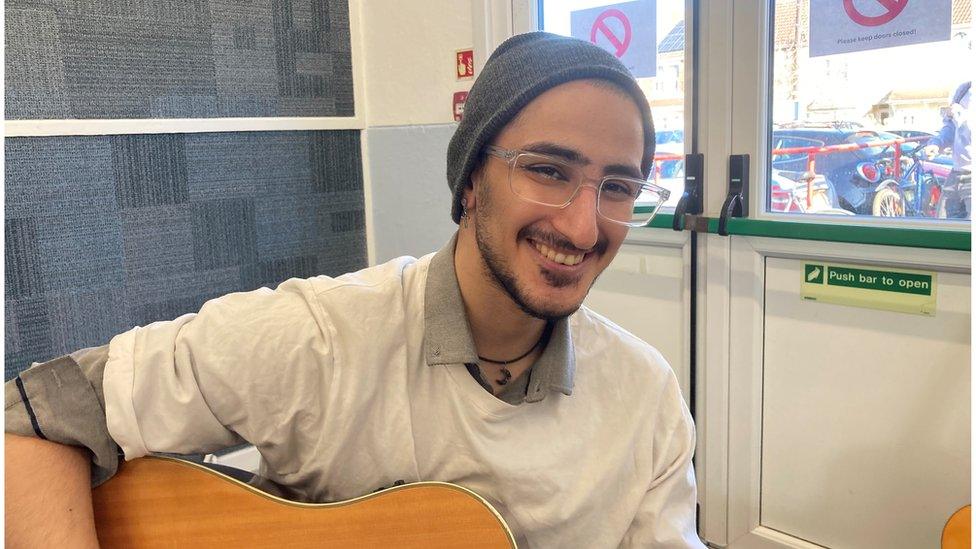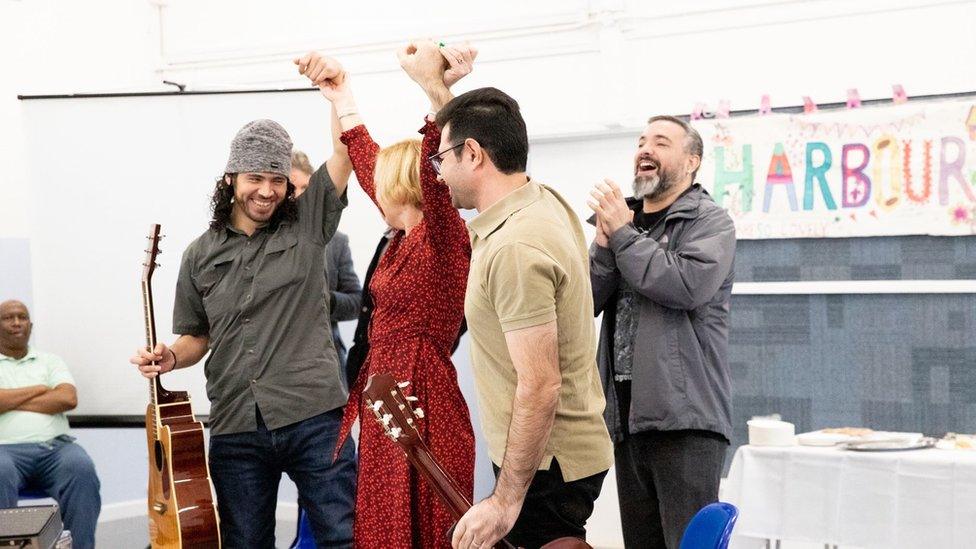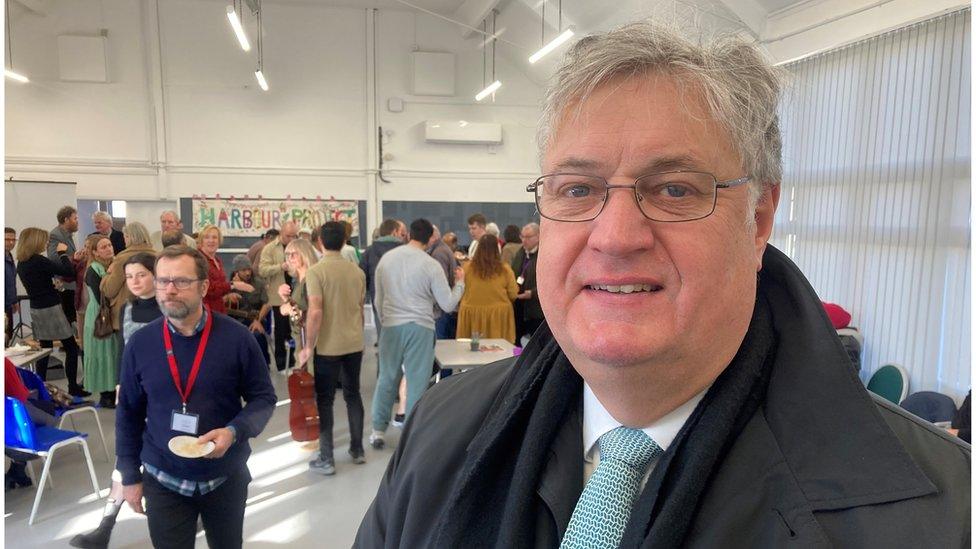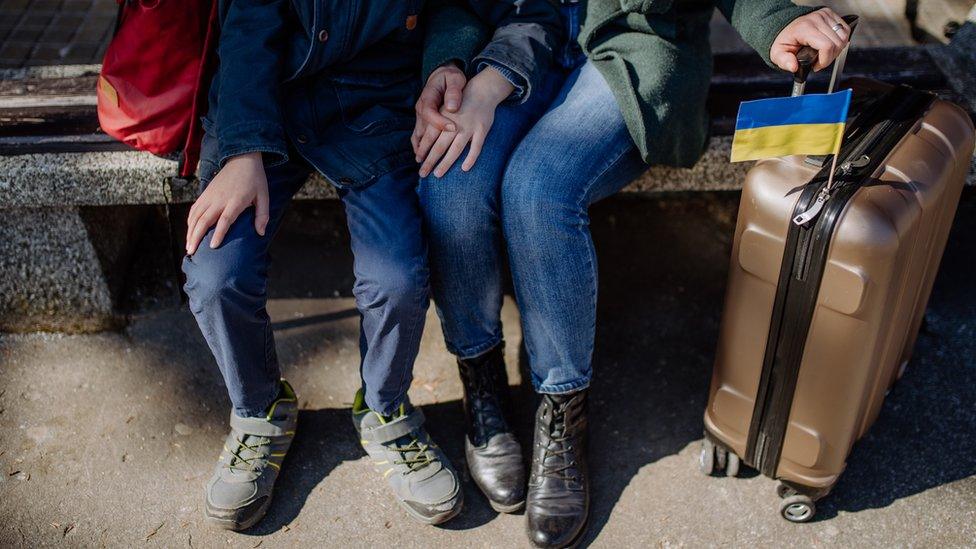LGBTQ supporter's uncertain future waiting for asylum
- Published

Faraz says playing music helps him to express himself and to relax
Being put up in a hotel for weeks might sound like a holiday, but for those facing persecution in their home country and awaiting refugee status in the UK, the reality is somewhat different.
Twenty-two-year-old Faraz was a bio-medical engineering student in Iran who had high hopes for his future.
However, his involvement in a student protest led to him being suspended from university.
The musician's support for LGBTQ people was enough to land him in trouble with the Iranian religious authorities.
Now he is seeking asylum in the UK.
Faraz has spent the past five months holed up in a hotel in Swindon, while he waits for his application to be processed by the Home Office.
A process that takes three to five years on average, according to The Harbour Project, a charity in Swindon that supports asylum seekers and refugees.
"I studied bio medical engineering at the University of Theran and they suspended me because of my activities for LGBTQ people.
"The government they are brutal to young people, arresting them.
"The government were calling me with anonymous numbers. I had to run away from my country."
His experience of being persecuted has not dimmed his fight though and during his downtime he has written a song dedicated to the teenagers back home that he says the government have arrested during student protests.
He said their families were struggling to obtain any information about their welfare.

Claire Garrett CEO of The Harbour Project says the charity seeks to uplift young people
"Nobody knows about them. They're [the government] not giving an answer to their families about where they are or how they are."
In contrast, he said despite "a really hard journey" to the UK that he recalled as being "like a nightmare" he said he has been treated well since arriving in the UK and was happy.
He said he found people in Swindon to be very friendly and had lent him instruments when they discovered he was a musician.
Inviting him to musical jams was a "beautiful" experience, that kept his spirits high, he added.
"Harbour Project is, I think, the greatest thing I have ever seen in the case of charities - the help and support that they provide, I haven't seen anything like it."
The charity organises a youth group for people aged between 18-25 to help maintain their motivation to continue their studies.
Fresh from a visit to The University of Bath, Faraz is enthused.
"I'm not sure yet about my future, but maybe I'm going to continue music or maybe continue my bio medical education, or maybe both."
Listen to Faraz tell his story to BBC Radio Wiltshire
The number of asylum seekers and refugees The Harbour Project supports has doubled between January and December to 1,500:
869 new people were registered (including 174 Ukrainians)
300 people were granted leave to remain (including 170 Ukrainians who were automatically given refugee status)
Ukrainians arriving in the UK have been given automatic refugee status [leave to remain] which means, unlike Faraz, they can begin working immediately.
CEO of The Harbour Project, Claire Garrett, describes people arriving with "hope, dignity and pride" that deteriorates the longer they wait for their application to be processed by the Home Office.
"By the time they get this [leave to remain] and are allowed to work, their skills may be outdated, years of inactivity has eroded their motivation and many suffer from deteriorating mental health," she said.
Surging numbers meant The Harbour Project outgrew its home of more than 20 years and moved in January to the newly refurbished Broadgreen Community Centre at a cost of £150,000 funded by the charity and South Swindon Parish Council.

David Renard, leader of Swindon Borough Council, said the council was working to help house people given leave to remain
Leader of Swindon Borough Council, David Renard, confirmed there were currently three hotels in the Swindon area housing asylum seekers.
Previously only single men were placed in hotels.
Councillor Renard was unable to confirm whether families were now also living in hotels.
Mr Renard said: "We're trying to find places for them to live and have a permanent and settled home, so we're working as a council with The Harbour Project on doing that.
"A lot of extra people are coming in so it has been a real challenge, but it's going well."
"We're in touch with the Home Office on a regular basis.
"It is a difficult moving situation, but as a council we will do what we can once these people get the status of right to remain."
In the past 12 months to September there were double the number of asylum claims nationally compared to the year before.
The Home Office received 72,027 claims and 16,400 initial decisions have been made on those applications.

Follow BBC West on Facebook, external, Twitter, external and Instagram, external. Send your story ideas to: bristol@bbc.co.uk , external
Related topics
- Published2 January 2023

- Published1 November 2022

- Published22 August 2022
